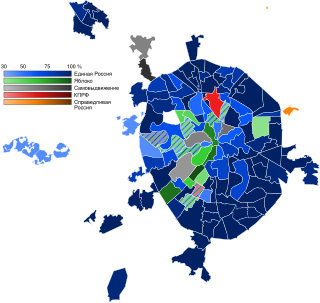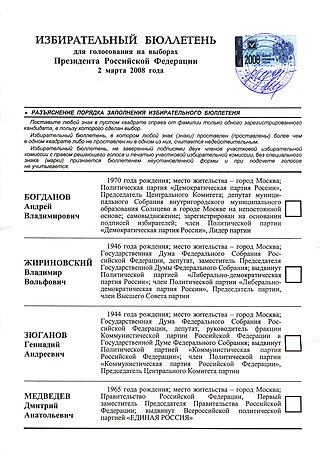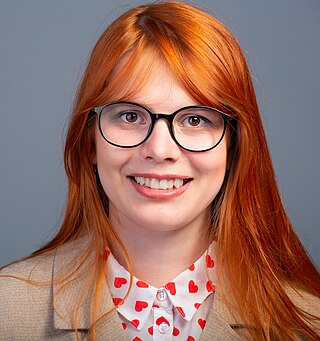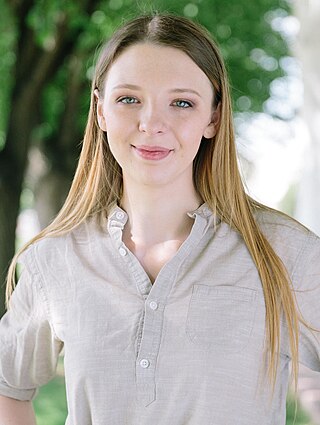The Russian United Democratic Party Yabloko is a social-liberal political party in Russia. The party consequently participated in the elections of deputies of the State Duma of the Federal Assembly of the Russian Federation of all eight convocations. Until 2003, Yabloko was represented by a faction in the State Duma and later until 2007 by individual deputies. In March 2002, the party became a full member of the Liberal International, and since November 1998, it has been in observer status. The founder of the party Grigory Yavlinsky is an honorary vice-president of the Liberal International and winner of its Prize for Freedom. Since 2006, Yabloko has been a member of the Alliance of Liberals and Democrats for Europe (ALDE). As of 2021, the party was represented by factions in 4 regional parliaments of the Russian Federation. In addition, members of the party were deputies of 13 administrative centers of the subjects of the Russian Federation, 183 representatives of the party were municipal deputies in Moscow and 84 in Saint Petersburg.

Boris Vsevolodovich Gromov is a Russian politician and former military officer. He was the Governor of Moscow Oblast between January 2000 and May 2012. Deployed thrice to fight in the Soviet–Afghan War, Gromov was the last Soviet soldier in Afghanistan on 15 February 1989; he commanded the 40th Army and oversaw the Soviet withdrawal as the last personnel retreated.
The People's Freedom Party, often known by its short form PARNAS, and formerly the Republican Party of Russia – People's Freedom Party, and initially Republican Party of Russia, was a liberal-democratic political party in Russia. It was one of the first opposition parties founded in the final years of the Soviet Union.

Sergey Sergeyevich Mitrokhin is a Russian politician.

Dmitry Gennadyevich Gudkov is a Russian politician and opposition leader. He was elected as a member of the State Duma in 2011–2016. His father, Gennady Gudkov, was also a Duma deputy in 2001–2012. Both father and son were members of the party A Just Russia. Gudkov was expelled from the party on 13 March 2013 after it accused him of "calling on the American authorities to interfere in Russia’s internal affairs". While Gudkov ran as candidate of Yabloko party and worked with the non-systemic opposition, he lost in the 18 September 2016 election for the Russian Parliament. In 2018, he and Ksenia Sobchak decided to align together, which lead to the creation of an opposition political party which is called the Party of Changes.

Nikolay Yurievich Kavkazsky is a Russian political, LGBT and drug policy reform activist, lawyer, member of numerous human rights organizations, blogger and a political prisoner.
Moscow Oblast gubernatorial election of 2013 was held on September 8, 2013 as part of the regional elections, where 9 other oblasts held elections. It was also the same day as the mayoral election in the federal city of Moscow.
The Coordination Council of the Russian opposition was a non-governmental political and civic body that existed in 2012—2013. Elections to the council were held on 20—22 October 2012. The Coordination Council of the first convocation was elected for one year, after which new elections were expected. However, they did not take place, and in October 2013, the council actually ceased to exist.

The Green Alliance, in 2012–2014 Alliance of Greens — People’s Party, in 2014–2015 Alliance of Greens and Social Democrats was a Russian political party based on Oleg Mitvol's Green Alternative movement and founded in 2012 as a party. The party is headed by Alexander Zakondyrin.

Nikolay Igorevich Rybakov is a Russian public and political figure, leader of the Russian United Democratic Party "Yabloko" since 2019, executive director of the Bellona – St. Petersburg (2008–2015), and board member of Transparency International – Russia.

The 2017 Moscow municipal elections took place in Moscow on 10 September 2017. Elections took place for deputies of the municipal councils in 124 of 125 districts of Moscow and in one administrative okrug, for a total of 1,502 seats, which were contested by around 7,500 candidates. The voter turnout was 14.82%. Although the post of municipal council member is relatively powerless, candidates for mayor of Moscow are required to obtain support from municipal deputies to stand in elections.

This article contains the list of candidates associated with the 2008 Russian presidential election.

Daria Stanislavovna Besedina is a Russian opposition politician, urbanist, deputy of the 7th Moscow City Duma, member of the Yabloko party from 2017 to 2021.

Maxim Yevgenyevich Katz is a Russian political opposition figure, urban planning activist, election campaign strategist, and popular YouTuber hosting his own daily political show.

Civic Initiative is a Russian centre-right political party. From 2018 to 2020, it was known as the Party of Changes. The founder of the party is Andrey Nechayev, who was the Minister of Economic Development from 1992 to 1993.

The Youth Democratic Movement "Vesna" is a Russian liberal democratic youth movement based in Saint Petersburg.

Anastasia Andreyevna Bryukhanova is a Russian opposition politician and public figure.
The Moscow legislative election of 2001 was held on 16 December of that year to the fourth convocation of the Moscow City Duma. The elections were held according to a majoritarian system in 35 single-mandate constituencies.

The City Projects Foundation, also called the Urban Projects Foundation, was a Russian non-profit foundation created by Russian politician Maxim Katz and Russian journalist Ilya Varlamov in 2012, and which had ceased its activities by in March 2022. The foundation was aimed at improving the urban environment through the use of modern urbanism data. The foundation overseas several initiatives in Moscow, which have met with mixed reactions from the authorities, and it also worked in many regions of Russia.

Maxim Lvovich Reznik is a Russian politician. Deputy of the Legislative Assembly of Saint Petersburg of the 5th and 6th convocations (2011–2021). Chairman of the St. Petersburg regional branch of the Yabloko party (2003–2012). Participant of the Free Russia Forum.